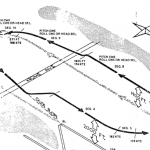Flight Path
My FLIGHT PATH for ETEC 565
We shall not cease from exploration
And the end of all our exploring
Will be to arrive where we started
And know the place for the first time.
T.S. Elliot
Flight path defined- the trajectory of a moving object to a fixed reference.
My name is Helen DeWaard. I am a moving object. I am an elementary school principal. I will soon retire from this position and will begin to explore new definitions and directions. I am a student, a teacher, a mother, a wife, a sister, an aunt and a friend. I bring each of these ways of defining myself into my life long journey as a self-directed learner.
The UBC-MET is my second Masters program. The first was through OISE, U. of T. in Special Education and Computers. My journey into the UBC-MET program comes from a need to continue explorations into educational technology. Through the MET program my goal is to open the global educational technology community, through examining research and effective use of technology, for my school, system and self.
Goal One
To increase my understanding of design, affordances and constructivist learning applications of Learning Management Systems is a primary goal since I am developing e-Mentoring modules for my school system. This involves learning about current content management systems and exploring Moodle. I would like to examine the application of simulation software, such as Second Life, to the mentoring/ coaching process.
Goal Two
To research practices in digital storytelling and learn how and why to use specific digital tools, such as Scratch, is goal two on my flight path. This goal is a need of my involvement in a joint international project proposal that, if approved, will involve my school district along with four European countries in collaborative action research projects involving educational technologies.
Goal Three
To continue to evaluate and reflect on relevant Web 2.0 tools that I have used (eg. blogs, wikis, xtranormal, animoto, prezi) and extend into ones not yet explored (eg. Facebook, Twitter, posting to YouTube). The purpose is to “inspire and facilitate … purposeful change that maximizes use of digital-age resources to meet and exceed learning goals, support effective instructional practice, and maximize performance”. (NETs for Administrators, 1a).
Goal Four
To investigate research and application tools relating to the educational application of ipad technology in elementary special education support and the needs of special learners in a differentiated classroom program. An application to my school district to purchase this technology for my current school is prompting this specific goal.
Goal Five
To have fun and to fly higher is my final goal on the flight path for ETEC 565 as well as the MET program. This will extend my learning of contemporary skills, foundational concepts and intellectual capabilities of, with and for educational technology.
With these goals outlined, I return to the quote and examine my need for reflection as a key element of this flight path. Taking time for reflection and exploration will be essential throughout this journey.
References
7 things you should know about digital storytelling, Educause Learning Initiative www.educause.edu/eli
Flight path image retrieved May 19, 2011 from http://www.google.ca/imgres?imgurl=http://www.langleyflyingschool.com/Images/
National Educational Technology Standards for Administrators http://www.iste.org/standards/nets-for-administrators/nets-for-administrators-sandards.aspx
National Educational Technology Standards for Teachers http://www.iste.org/Content/NavigationMenu/NETS/ForTeachers/2008Standards/NETS_for_Teachers_2008.htm
Moore, A., Moore, J., & Fowler, S., (2005) Faculty development for the net generation, In Educating the Net Generation, Oblinger, D. & Oblinger, J. Editors (2005) An Educause Book, Retreived May 13, 2011 from www.educause.edu/educatingthenetgen/
Silva, K., Correia, A., Pardo-Ballester, C. (2010) A Faculty mentoring experience: Learning together in second life, Journal of Digital Learning in Teacher Education, Volume 26, Number 4 Retrieved Jan, 2011
Stewart, C., Bachman, C., & Babb, S., (2009) Replacing professor monologues with online dialogues: A constructivist approach to online course template design, MERLOT Journal of Online Learning and Teaching, Vol. 5, No. 3
